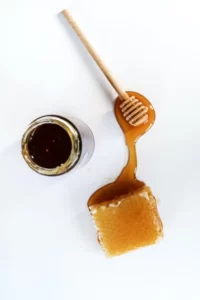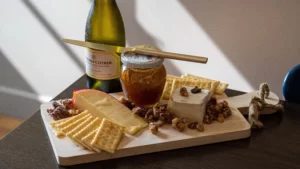Table of Contents
Cats are known for their finicky eating habits, and as responsible pet owners, it’s crucial to ensure that the foods we offer our feline companions are safe and suitable for their dietary needs. When it comes to honey, a common kitchen staple, many pet owners wonder whether it’s safe to share this sweet treat with their beloved cats.
Can Cats Eat Honey?
While cats are obligate carnivores, primarily relying on a diet of meat, they may occasionally show interest in sweet substances like honey. However, it’s important to exercise caution when considering giving honey to your cat.
Benefits of Honey for Cats
Honey is a natural sweetener and some cats may be attracted to its sweet taste. In small quantities, honey can be a tasty treat for your feline friend. Additionally, honey has been used in human remedies for its potential soothing properties. Some pet owners believe that honey can help with coughs or sore throats in cats when administered in tiny amounts. However, always consult your veterinarian before using honey as a home remedy for any health issue your cat may have.
Risks and Considerations
There are several risks and considerations associated with feeding honey to cats. Firstly, honey is high in sugar, and excessive sugar consumption can lead to obesity in cats. Obesity is a significant health concern and can contribute to various other health issues, including diabetes.
Secondly, honey can sometimes contain spores of the bacteria Clostridium botulinum, which can cause botulism in cats. Adult cats are generally less susceptible to botulism than infants, but it’s still a risk to consider, especially for kittens.
Thirdly, just like humans, cats can have allergies. While honey allergies in cats are rare, it’s possible that your cat might have an adverse reaction if they consume it for the first time. Lastly, honey may cause gastrointestinal upset in some cats, leading to diarrhea or stomach discomfort.
How to Safely Offer Honey to Your Cat
If you decide to offer your cat honey, do so in moderation. A small lick or a tiny amount on a spoon is sufficient. Avoid giving them more significant quantities. Opt for high-quality, pasteurized honey, as it’s less likely to contain harmful bacteria like Clostridium botulinum. Raw honey should be avoided because it carries a higher risk of bacterial spores. When introducing honey for the first time, watch your cat closely for any signs of allergies or adverse reactions. These may include itching, swelling, vomiting, or diarrhea. If you notice any of these symptoms, discontinue honey immediately. Before using honey as a remedy for any health issue your cat may have, consult your veterinarian. They can provide professional advice and recommend safer alternatives if necessary.
Alternatives to Honey for Cats
If you’re looking for safe and suitable alternatives to honey for your cat, there are plenty of options that can provide a sweet treat or address specific needs without the risks associated with honey. Here are some alternatives:
-
Cat-Specific Treats: Commercially available cat treats are formulated to meet the dietary needs of cats while providing a tasty reward. These treats come in various flavors and textures, making it easy to find something your cat enjoys.
-
Catnip: Many cats are highly responsive to catnip, which is a safe and natural herb. Catnip can be used as a treat or a toy. It provides sensory stimulation and can be a fun and enjoyable alternative to sweet treats.
-
Frozen Cat-Friendly Treats: Create your own cat-friendly frozen treats by freezing small portions of wet cat food or plain chicken broth (no onions or garlic). Cats often enjoy licking and chewing on these icy delights.
-
Commercial Cat Food Pouches: Some brands offer cat food in pouches that can be used as occasional treats. Look for options with minimal additives and high-quality ingredients.
-
Plain Cooked Meat: Small amounts of plain, cooked chicken or turkey can be a delicious and protein-rich treat for your cat. Make sure there are no seasonings, spices, or bones in the meat.
-
Canned Pumpkin: In small quantities, plain canned pumpkin (not pumpkin pie filling) can be given as an occasional treat. It’s not sweet, but some cats find it appealing, and it may help with digestion.
-
Fresh Cat Grass: Growing cat grass (often wheatgrass) indoors can provide a natural treat for your cat. Many cats enjoy nibbling on grass, and it can also aid in digestion.
-
Interactive Toys: Some interactive cat toys dispense treats as a reward when your cat plays with them. These toys can engage your cat mentally and physically while providing a treat.
If you’re looking for specific treats or dietary options to address a particular health concern or dietary restriction for your cat, consult your veterinarian. They can provide recommendations tailored to your cat’s individual needs.
Caring for Your Cat’s Health
When it comes to your cat’s health, there are a few key considerations to keep in mind:
-
Weight Management: Obesity is a common issue in cats, and excessive consumption of sugary treats like honey can contribute to weight gain. Regular exercise and portion control are essential for maintaining a healthy weight for your cat.
-
Regular Veterinary Check-Ups: Schedule regular check-ups with your veterinarian to ensure your cat’s overall health. They can provide guidance on diet, nutrition, and any specific health concerns your cat may have.
-
Hydration: Cats can be prone to urinary tract issues, so it’s vital to ensure they are adequately hydrated. Always provide fresh, clean water for your cat. While honey can be tempting, it should never replace water.
In conclusion, while honey is not inherently toxic to cats, it should be given sparingly and with caution. Small amounts of honey as an occasional treat may be safe for some cats, but it’s essential to monitor your cat for any adverse reactions. If you have concerns about your cat’s health or want to use honey as a remedy for a specific issue, it’s best to consult your veterinarian before offering honey to your feline friend.
As a responsible pet owner, always prioritize your cat’s well-being by ensuring they have a balanced and appropriate diet, consulting with a veterinarian for dietary advice, and avoiding excessive indulgence in sweet treats like honey.



